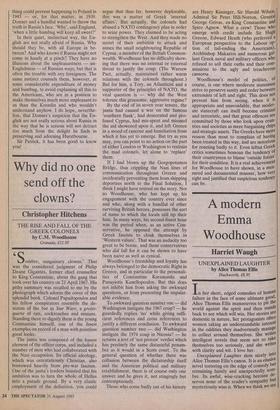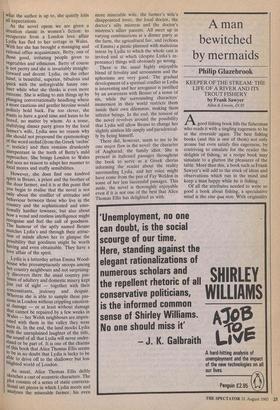A modern Emma Woodhouse
Harriet Waugh UNEXPLAINED LAUGHTER by Alice Thomas Ellis Duckworth, £8.95 In her short, edged comedies of human failure in the face of some ultimate good, Alice Thomas Ellis manoeuvres to pit the world against the spirit and then stands back to see which will win. Her stories are domestic in nature, her protagonists often women taking an understandable interest in the oddities they inadvertently manage to collect around themselves. She writes intelligent novels that seem not to take themselves too seriously, and she writes with clarity and wit. I love her. Unexplained Laughter slots nicely into Alice Thomas Ellis's canon. It is an elusive novel teetering on the edge of comedy but remaining faintly and unexpectedly som- bre. Its awful, wise-cracking heroine de- serves none of the reader's sympathy but mysteriously wins it. When we think we see what the author is up to, she quietly foils all expectations.
As the novel opens we are given a situation classic in women's fiction: to recuperate from a London love affair Lydia has fled to her cottage in Wales. With her she has brought a managing and rational office acquaintance, Betty, one of those good, irritating people given to vegetables and ethnicism. Betty of course is not pretty and she is invariably straight- forward and decent. Lydia, on the other hand, is beautiful, superior, bibulous and quick with the unforgivable funny one- liner while what she thinks is even more extreme. She is willing to mix things up by plunging conversationally headlong where a more cautious and gentler heroine would Politely hold back. Far too clever, she wants to have a good time and hates to be bored, no matter by whom. At a tense, stultifying dinner party given by the local farmer's wife, Lydia sees no reason why she should not propound the epistemology of the word orchid (from the Greek 'orchis' testicle) and then remains drunkenly unrepentant in the teeth of Betty's mild reproaches. She brings London to Wales and sees no reason to adapt her manner to local mores and stuffy sensibilities.
However, she does find one kindred sPirit in Beuno, a priest and the brother of the dour farmer, and it is at this point that You begin to realise that the novel is not Only about the conflict of attitudes and behaviour between those who live in the Country and the sophisticated and emo- tionally hardier townees, but also about how a venal and restless intelligence might recognise and feel the call of goodness. The humour of the aptly named Beuno snatches Lydia's and through their attrac- tion of minds allows her to glimpse the Possibility that goodness might be worth having and even obtainable. They have a love affair of the spirit.
Lydia is a iatterday urban Emma Wood- house who presumptuously snoops among her country neighbours and not surprising- ly discovers there the usual country pas- times of adultery and domestic misery kept Just out of sight — together with their concomitants, jealousy and despair. ‘Yhereas she is able to sample these pas- sions in London without crippling emotion- al damage — or at least without damage that cannot be repaired by a few weeks in Wales — her Welsh neighbours are impris- oned with them in the valley they were born in. In the end, the land mocks Lydia with the unexplained laughter of the title, the sound of all that Lydia will never under- stand or be part of. It is one of the charms of this book that Alice Thomas Ellis seems to be in no doubt that Lydia is lucky to be able to drive off to the shallower but less blighted world of London.
As usual, Alice Thomas Ellis deftly sketches a cast of eccentric characters. The plot consists of a series of static conversa- tional set pieces in which Lydia meets and analyses the miserable farmer, his even more miserable wife, the farmer's wife's disappointed lover, the local doctor, the doctor's silly mistress and the doctor's mistress's sillier parents. All meet up in varying combinations at a dinner party at the farm, the agricultural fair, and (echoes of Emma) a picnic planned with malicious intent by Lydia to which the whole cast is invited and at which (despite Lydia's re- pentance) things will obviously go wrong.
There is the usual highly enjoyable blend of frivolity and seriousness and the aphorisms are very good. The gradual development of a spiritual conflict in Lydia is interesting and her arrogance is justified by an awareness with Beuno of a sense of sin, while the surrounding characters' immersion in their world restricts them inside their own dilemmas, making them inferior beings. In the end, the tension of the novel revolves around the possibility that Lydia will allow Beuno to change her slightly aimless life simply and paradoxical- ly by being himself. There did, however, seem to me to be one major flaw in the novel: the character of Angharad, the family idiot. She is present in italicised passages throughout the book to serve as a Greek chorus informing the reader about the reality surrounding Lydia, and her voice might have come from the pen of Fay Weldon in some of her less successful passages. This aside, the novel is thoroughly enjoyable even if it is not one of the best that Alice Thomas Ellis has delighted us with.











































 Previous page
Previous page